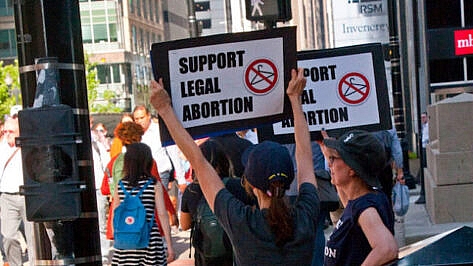Two days after the Supreme Court overturned Roe v. Wade, Republicans and Democrats across the country are working to map out their next moves amid a changed political landscape.
Summary
Two days after the Supreme Court overturned Roe v. Wade, Republicans and Democrats across the country are working to map out their next moves amid a changed political landscape.
- Thirty states will adopt laws more restrictive than the Roe status quo, while twenty will experience no changes.
- Eight states – Alabama, Arkansas, Kentucky, Louisiana, Missouri, North Dakota, Oklahoma, and South Dakota – prohibit abortion in all cases except when the woman’s health is at serious risk.
- Four states – Idaho, Mississippi, Utah, and Wyoming – prohibit abortion in all cases except rape, incest, and when the woman’s health is at serious risk.
- Five states – Georgia, Ohio, South Carolina, Tennessee, and Texas – prohibit abortion after six to eight weeks, which is stricter than most European countries.
- Two states – Arizona and Florida – prohibit abortion after 15 weeks, on par with most European countries.
- Seven states – Indiana, Iowa, Kansas, Montana, Nebraska, North Carolina, and West Virginia – prohibit abortion after 20 or 22 weeks, more permissive than most European countries.
- Four states – Alaska, Michigan, Pennsylvania, and Wisconsin – allow abortion through 24 weeks but have critical elections in November that could alter the status quo going forward.
- Twenty states – California, Colorado, Connecticut, Delaware, Hawaii, Illinois, Maine, Maryland, Massachusetts, Minnesota, Nevada, New Hampshire, New Jersey, New Mexico, New York, Oregon, Rhode Island, Vermont, Virginia, Washington, (plus DC) allow abortion either until viability (24 weeks) or until the 9th month of pregnancy.
- These states are among the most permissive jurisdictions in the world, along with Canada, the Netherlands, China, Vietnam, Singapore, and North Korea.
- Democratic governors pledged to assist women in states where abortion is now illegal and now must travel across state lines to seek an abortion. The governors of the three West Coast states announced a “multi-state commitment” while Gov. Roy Cooper (D-NC) called Democratic governors “the last line of defense.”
![]()
- The New York Times covered the surge in demand for abortion pills in the wake of the Supreme Court’s decision. Medication abortions now make up more than half of all abortions and would present an enforcement challenge in states that have newly banned abortion.
- POLITICO called Republicans “the dog who caught the car.” The outlet interviewed several G.O.P. strategies who, while praising the decision in public, expressed concern that the ruling could damage Republican electoral prospects in November’s midterm elections.
- Second-wave feminists like Gloria Steinem expressed disbelief to the Associated Press that the crowning achievement of their movement – nationwide abortion on demand – was now a thing of the past.
![]()
- Fox News covered riots in Portland, Oregon in the wake of the ruling. A group of about 100 rioters smashed windows and vandalized buildings in the downtown area and graffitied walls “Death to SCOTUS.”
- The Washington Examiner reported on one of the first polls conducted after the Supreme Court’s decision. Over 59 percent of Americans disagreed with the ruling, including 67 percent of women.
- Breitbart covered pro-abortion rioters’ attempt to storm the Arizona state capitol while it was in session, leading one state senator to say they were being “held hostage” by the rioters. Arizona police officers deployed tear gas and the crowd dispersed.
© Dominic Moore, 2022






